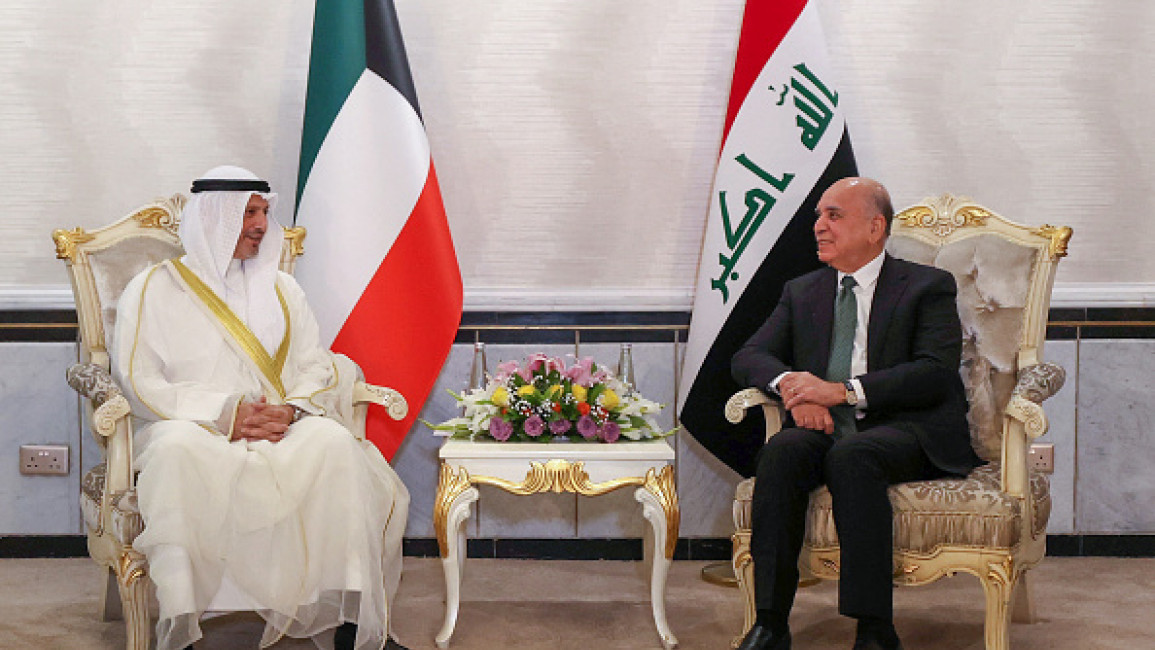Iraqi parliament rejected proposed demarcation of borders with Kuwait
Iraqi experts, lawmakers, and activists have rejected a recently proposed demarcation of borders and maritime areas between Iraq and Kuwait.
The demarcating of borders and a contested maritime area between Iraq and Kuwait has turned into a public opinion issue in Iraq, with many Iraqis criticising "concessions" about Iraq's historical rights in Umm Qasr port city in southern Iraq to Kuwait.
Muhssin Mandalawi, the first deputy speaker of Iraq's parliament on Tuesday, decided to form a special committee tasked with preparing an urgent report on Iraq's border and maritime rights with Kuwait, Iraq's state television reported.
The parliament's foreign relations committee is expected to invite senior officials in the foreign ministry to present needed clarifications on the ongoing negotiations with Kuwait, Aryan Tawagozi, a member of the committee from the "New Generation" opposition bloc, told The New Arab in a brief phone call.
"Our committee will hold a meeting this week. We plan to invite some officials from Iraq's foreign ministry to make their clarifications on the issue," Tawgozi said. "There are long historical issues between Iraq and Kuwait. The two sides must deal with these issues fairly and according to international law."
نداء ومناشدة
— لواء ركن دكتور . جمال الحلبوسي (@d_alIraq) July 31, 2023
الى كل ذي غيرة وشرف من نائب / ة ، مسؤول / ة عراقي /ة ولكل من يدافع عن حقوق بلدنا
نرفض التوقيع ويجب إيقاف هذا الاجراء لانه جريمة لا تغتفر وإضاعة لحقوق العراق في الارض والمياه والمجالات البحرية
هل من ناصر لك يا عراق
هل من رشيد مدافع
عمموا هذا الطلب قبل فوات الأوان https://t.co/bQnW2cb4wo
On Sunday, 30 July, Iraq's Foreign Minister Fuad Hussein met with his Kuwaiti counterpart Salem Al-Sabah and an accompanying delegation in Baghdad.
"The emphasis was placed on resolving the border issues," Hussein said during a joint press conference. He indicated that the governor of Basra Asaad al-Eidani, and representatives from Iraq's ministries of transportation and oil have attended the meeting with the Kuwaiti delegation.
He told reporters the border talks would "continue through various technical committees".
Al-Sabah said that a delegation from his country's oil ministry will visit Baghdad on 10 August to negotiate how to handle joint oilfields, and a legal committee relating to the talks will be in the Iraqi capital on 14 August.
He also thanked al-Edani for promising to "demolish houses of Iraqis in Umm Qasr soon."
سيكون لنا موقف ميداني وأخر قانوني عن ما يحصل من اتفاق عراقي كويتي حول ترسيم الحدود، فالارض ليست ملك اي مسؤول حتى يتم التنازل عنها .
— مصطفى جبار سند (@m_j_sanad) August 1, 2023
The statement by Kuwait's FM angered Iraqi lawmakers, experts and social media users who created a trending hashtag on Twitter and called for refusing to draw borders and "selling Umm Qasr" to Kuwait. Many Iraqis have claimed that Iraq's senior officials have been "bribed" by Kuwaiti officials to accept the country's demands during the ongoing negotiations.
People of Basra on Tuesday, 1 August, took to the streets and refused the statement by Kuwait's FM and threatened they would not accept demolishing their homes by any means.
The de facto land and maritime borders between the neighbouring states were established by the United Nations in 1993, three years after Iraq under Saddam Hussein invaded Kuwait.
Jamal al-Halbusi, an Iraqi expert on international borders and the former head of Iraq's delegation to negotiate the drawing of borders with Kuwait, has called on the Iraqis not to let the Iraqi officials sign the current understandings with Kuwait.
"We refuse to sign this measure that should be stopped because it is an unforgivable crime and a waste of Iraq's rights in land, water, and maritime," he tweeted on Monday.
Iraq's prime minister Mohammed Shia Al- Sudani, sacked al-Halbusi and replaced him with Mohamed Bahr Al-Uloom, undersecretary of Iraq's foreign minister and Iraq's representative to the United Nations.
He was Iraq's former ambassador to Kuwait. Some Iraqis have claimed he is also a Kuwaiti citizen, hence cannot defend Iraq in front of Kuwait.
Independent Iraqi lawmaker from Basra, Mustafa Jabbar Sanad, said in a tweet that he would have his stance on the ground and through legal measures regarding the demarcation of joint borders with Kuwait.
"The land is not the property of any official to make concessions on it," Sanad said, indirectly pointing to accusations against Basra's governor that he had received bribes from Kuwait for his consent on demolishing houses in Umm al-Qasr.
Another contested issue between Iraq and Kuwait is the disputed gas field of Durra. Saudi Arabia and Kuwait stressed "exclusive rights" over the field, which has about 220 billion cubic metres (seven trillion cubic feet) of recoverable reserves.
On the other hand, the Iranian government has come under increasing pressure from domestic critics to "defend Iran's rights" in what Iranians call the Arash gas field, known as al Durra by Kuwait and Saudi Arabia, and Known as "Jamal" by Iraq. Al-Halbusi has said Iraq also has rights in the disputed gas field.
Iran claims 40 per cent ownership of the Arash-Durra gas field. In late June, the managing director of the National Iranian Oil Company said that Iran was ready to start drilling on the Iranian side of the joint gas field.
Iraq's Saddam Hussein ordered his army to invade Kuwait and seize what he described as "Iraq's 19th province" on August 2, 1990, before being pushed back seven months later by a US-led coalition.



